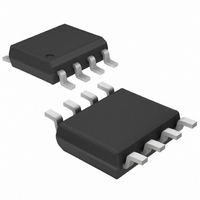DS2482S-100+T&R Maxim Integrated Products, DS2482S-100+T&R Datasheet - Page 6

DS2482S-100+T&R
Manufacturer Part Number
DS2482S-100+T&R
Description
IC I2C TO 1WIRE BRIDGE 8SOIC
Manufacturer
Maxim Integrated Products
Datasheet
1.DS2482S-100.pdf
(24 pages)
Specifications of DS2482S-100+T&R
Controller Type
I²C Bus Controller
Interface
I²C
Voltage - Supply
3.3 V, 5V
Current - Supply
750µA
Operating Temperature
-40°C ~ 85°C
Mounting Type
Surface Mount
Package / Case
8-SOIC (3.9mm Width)
Lead Free Status / RoHS Status
Lead free / RoHS Compliant
Single-Channel 1-Wire Master
The DS2482-100 has three registers that the I
can read: Configuration, Status, and Read Data. These
registers are addressed by a read pointer. The position
of the read pointer, i.e., the register that the host reads
in a subsequent read access, is defined by the instruc-
tion the DS2482-100 executed last. To enable certain
1-Wire features, the host has read and write access to
the Configuration Register.
The DS2482-100 supports three 1-Wire features that
are enabled or selected through the Configuration
Register. These features are:
• Active Pullup (APU)
• Strong Pullup (SPU)
• 1-Wire Speed (1WS)
These features can be selected in any combination.
While APU and 1WS maintain their state, SPU returns to
its inactive state as soon as the strong pullup has ended.
After a device reset (power-up cycle or initiated by the
Device Reset command), the Configuration Register
reads 00h. When writing to the Configuration Register,
the new data is accepted only if the upper nibble (bits 7
to 4) is the one’s complement of the lower nibble (bits 3
to 0). When read, the upper nibble is always 0h.
Figure 2. Rising Edge Pullup
6
_______________________________________________________________________________________
BIT 7
V
V
IL1(MAX)
IH1(MIN)
BIT 6
V
CC
0V
1-Wire BUS IS DISCHARGED
Configuration Register
Device Registers
BIT 5
1
APU = 1
t
1
2
BIT 4
C host
t
2
t
APUOT
The APU bit controls whether an active pullup (con-
trolled slew-rate transistor) or a passive pullup (R
resistor) is used to drive a 1-Wire line from low to high.
When APU = 0, active pullup is disabled (resistor
mode). Active pullup should always be selected unless
there is only a single slave on the 1-Wire line. The
active pullup does not apply to the rising edge of a
presence pulse or a recovery after a short on the
1-Wire line.
The circuit that controls rising edges (Figure 2) oper-
ates as follows: At t
or 1-Wire slave) ends. From this point on, the 1-Wire
bus is pulled high through R
DS2482-100. V
line determine the slope. In case that active pullup is
disabled (APU = 0), the resistive pullup continues, as
represented by the solid line. With active pullup
enabled (APU = 1), and when at t
reached a level between V
DS2482-100 actively pulls the 1-Wire line high, applying
a controlled slew rate as represented by the dashed
line. The active pullup continues until t
at t
See the Strong Pullup (SPU) section for a way to keep
the pullup transistor conducting beyond t
BIT 3
1WS
3
. From that time on the resistive pullup continues.
Configuration Register Bit Assignment
t
3
CC
APU = 0
BIT 2
SPU
and the capacitive load of the 1-Wire
1
, the pulldown (from DS2482-100
IL1(MAX)
BIT 1
0
WPU
Active Pullup (APU)
and V
2
APUOT
the voltage has
internal to the
3
.
IH1(MIN)
is expired
BIT 0
APU
, the
WPU














